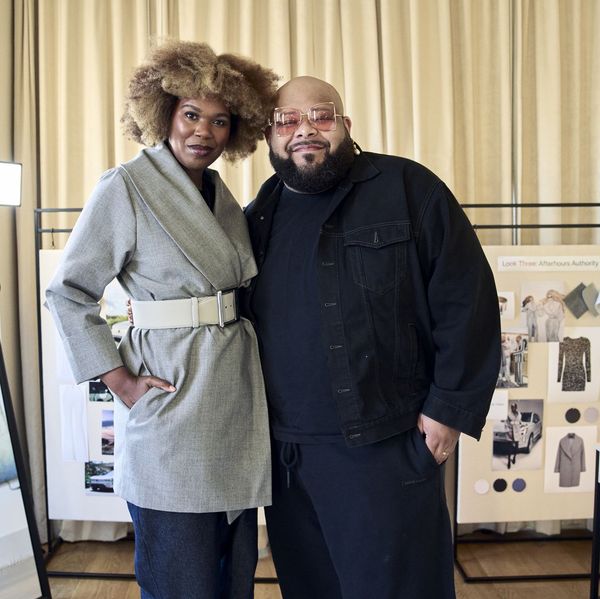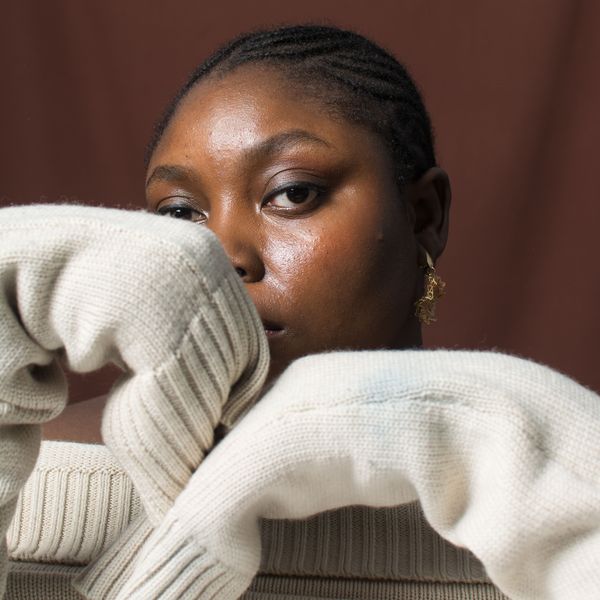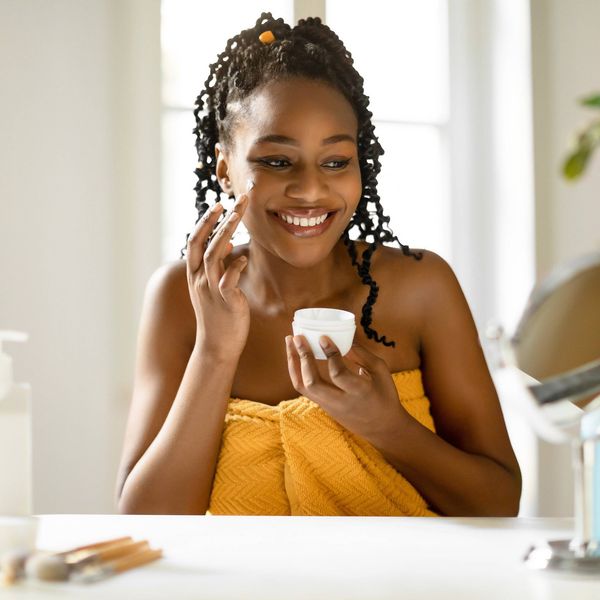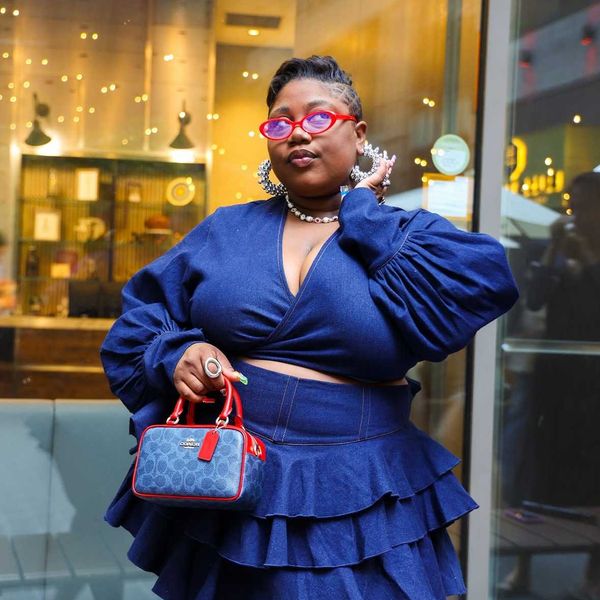
Now that springtime is officially present and accounted for, I wanted to find a way to put a twist to the type of “spring cleaning” that is typically discussed (check out “15 Of The Best Spring Cleaning Hacks That I've Seen In A Minute”).
For instance, in times past, I would broach the topic from the angle of relationships (check out “Let's Finally 'Spring Clean' ALL Of Our Exes Out Of Our Lives, Shall We?”) or even intimacy (check out “Yes Couples, You Can 'Spring Clean' Your Sex Life”). This year, I thought it would be cool to explore how you can get your hair, skin, and nails ready for all that this beautiful spring season has to offer.
Check out the following 15 things that you can do (five per category), beauty-wise, to embrace all that spring has in store — things that will have you out here looking even more radiant than you already do!
Hair

Getty Images
1. Clarify your hair. Sweat, dead skin cells, product build-up, minerals in your water, excessive sebum, whatever falls into your hair when you’re outdoors (like pollen) — all of these things play a significant role in why it’s important to clarify your hair from time to time and clarifying is simply about using things that will help to get rid of the residue that’s on your strands. Clarifying is actually why I don’t cosign with people who say that you should NEVER use sulfate shampoos; I just believe that you should ONLY use them to clarify your locks (so long as they aren’t too harsh on your hair).
So, what are some signs that your hair needs clarifying?
If your hair feels oily or sticky; if it’s hard for it to hold a style; if your scalp is itchy or irritated; if you notice that your hair is shedding more than it should (which is 50-100 strands a day); if your hair is dull and/or (bonus) if you are about to color-treat your hair (because build-up will make it difficult for the color to “take”). You can clarify your tresses with a clarifying shampoo (check out a list here). Or, if you’d prefer to take the all-natural route, apple cider vinegar, baking soda, bentonite clay, and even Aloe vera are awesome options (click on each of the words to learn why and how to apply them in this way).
2. Exfoliate your scalp. Honestly, the main way that I know it is time for me to wash my hair is when my scalp tells me so. When it’s itchy and/or flaking, that’s my cue. Oftentimes, what I will do is either provide my scalp with a good rinse (I really like TPH BY TARAJI Master Cleanse Scalp Treatment) or a scalp exfoliant. That’s because, just like your hair can experience residue, your scalp can as well (especially when it comes to dead skin cells and product build-up). Plus, a scalp that isn’t exfoliated can end up having clogged hair follicles which can ultimately mess with your hair growth.
If you want to go the exfoliant route, there are scalp scrubs that you can buy. You can also crush some aspirin up, add a bit of water to it, and rub it on your scalp, create a brown sugar and oatmeal scalp scrub or you can check out some other recipes here.
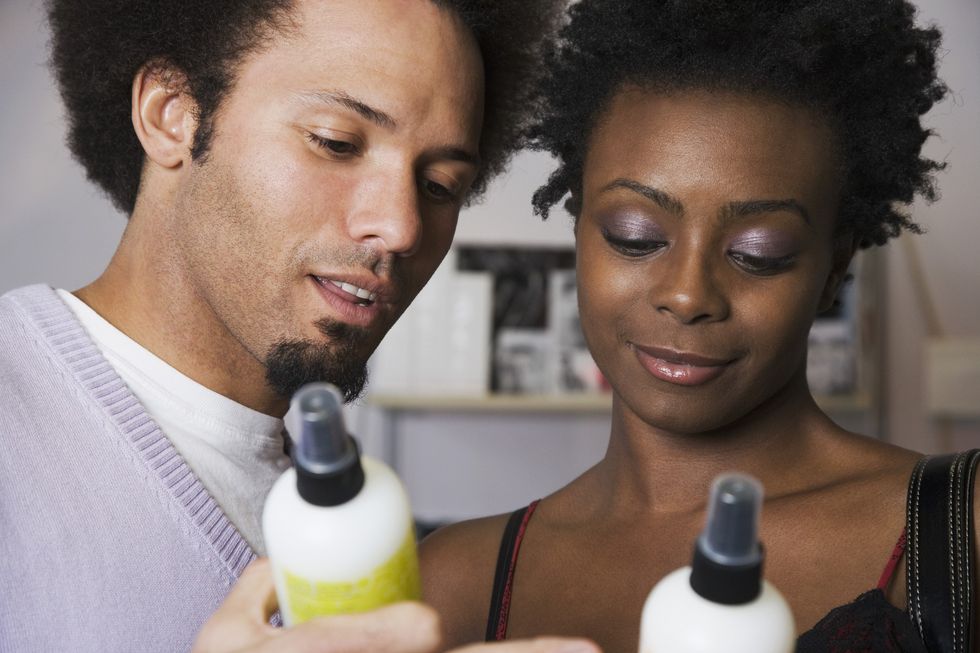
Getty Images
3. Address those ends. It can’t be said enough that, if you’re trying to grow out your hair, it doesn’t matter how much you take care of the roots of your hair if you’re neglecting your ends in the process. In fact, a huge part of the reason why a lot of people don’t end up reaching their hair (length) goals is because their locks end up breaking off just about as fast as their hair grows from their scalp. One way to avoid this from happening is to “baby” the entire mess out of your ends — and y’all, a product that I’ve been using that helps me to do this oh so very well is Amika Starfruit Oil. Listen, stuff that has worked for me personally, I do my best to shout-out and this product right here? It’s the truth! It’s a lightweight oil that feels kind of like a serum that really does create shine, lessen frizz and help to make your hair feel so much stronger — including your ends. Now, it ain’t cheap; still, a little bit goes a long way which makes it worth the expense (at least it does to me). Anyway, whether it’s getting a trim, dusting your ends (removing split ends and fairy knots on your own) or just giving your ends some much needed TLC, this would be the time to do it…especially so.
4. Toss out expired hair products. Be honest with me and yourself — you know you’ve got some hair products that should’ve gone on to glory a long time ago, simply because the lettering is faded and/or you really can’t remember when you purchased it (check out “Resolving To Kick Your Product Junkie Habit? Here's Your Game Plan For 2024.”). I’ll be real with you, unfortunately, most hair products don’t come with an expiration date; however, a good rule of thumb to follow is if your products change color, smell, or texture, it’s probably time to toss ‘em out.
And when it comes to shampoos and conditioners specifically, many experts say that around six months is when it’s time to get some new stuff. Oh and also, please wash your brushes, combs and clean out the teeth of your hair dryers, and thoroughly wipe off your flat irons. You’d be amazed how much gunk can get caught up in all of those things. #yuck
5. Replenish your collection with lighter water-based ones. Since warmer weather tends to lead to hair that has more oil and residue than during the cooler months, if you’re going to buy some new hair products make sure that they contain less oils and butters and more water instead. The reason why is because the last thing that you want is for it to be a nice spring-like day with the wind blowing and yet your hair doesn’t move one bit because it’s so weighed down by all of your hair products. If you’d like a few recommendations of what to get for this season, check out BuzzFeed’s “27 Products That’ll Take Your Hair From Winter Drab To Spring Fab.”
Skin

Getty Images
1. Get a professional facial. It’s pretty common that, as it heats up outside, you may want to wear less make-up — at least during the daytime hours because between the sweat and everything? It can just be easier to take the “less is more” approach. If that is exactly how you roll (or you do like make-up and you would like for it to go on more smoothly), consider getting a professional facial as soon as possible. I’m good for getting a back facial at the turn of every season and there is nothing like having a professional esthetician get all up in your skin and treat issues in ways that you simply can’t (because you haven’t been trained to).
When it comes to your face, professional facials are bomb because they can deeply cleanse, exfoliate, hydrate, improve the texture, and treat trouble areas all at the same time. I promise you, after getting a facial from someone who really knows what they are doing, your skin will glow on a completely different level!
2. Clean all of your make-up tools. Chile, guess how often the average American changes their sheets (SMDH): every 24 days…that’s damn near once a month. Now guess how often you’re supposed to do it: no less than once a week and actually every 2-4 days if you have pets or allergies. If most folks aren’t doing this, I can only imagine how few are cleaning their makeup brushes, etc. And how often should you do that? Every 7-10 days (more often than that, if you can). And although you shouldn’t wait for spring to do this, this is just a reminder to set aside a day to clean everything at once.
For tips on how to properly clean your brushes, check out the YouTube channel ItsMyRayeRaye’s post here. Tips on how to clean cosmetic sponges? Roxslayofficial’s page can help you out here. And if you tend to put your brushes and sponges in a drawer in your bathroom, invest in a nice vase for your brushes or something like a magnetic brush organizer. As far as your sponges go, a cute soap dish that has holes in it or an egg case will work.
3. Look for skincare products that contain antioxidants and ceramides. Since there’s a pretty good chance that you’ll be out in the sun more often, you need to make sure that your skin is protected from the damage that free radicals, air pollution, and UV rays can do. One way to do this is by looking for skincare products that are packed with antioxidants. Ones that immediately come to mind include vitamin C extract, and vitamin E oil as well as products that have niacinamide (vitamin B6) and polyphenols listed on the label.
Something else to look for is skin products that contain ceramides; they are lipids that easily makeup 50 percent of the outer layer of your skin. When you apply skincare items that contain them, those ceramides help to hydrate your skin, protect the barrier, and slow down the signs of aging. I use ceramides on my neck at night and baby, no regrets. Not a damn one.

Getty Images
4. Go without make-up more often. Whenever someone tells me that I don’t look my age, I thank genetics and the fact that I didn’t start wearing make-up (other than mascara and lipstick which is pretty much how I get down now) until I was well into my 20s. There is no way around the fact that prolonged cosmetic use (especially when it comes to certain ingredients), yes, can speed up the aging process of your skin. It can also lead to breakouts; cause your pores to appear larger than they actually are; throw off the pH balance of your skin; create the appearance of fine lines, and it can weaken your skin’s barrier. That’s why it’s a good idea to give your skin a break by going make-up-free sometimes.
Since spring cleaning is the theme, focus more on skincare than cosmetics so that, by the time the summer season arises, if you go swimming, you don’t have to worry about going au naturel because your natural skin will be so on-point on its own (check out “I've Been Doing At-Home Chemical Peels. Here Are The Pros And Cons.,” “Why Your Skin, Hair, And Nails Need Hyaluronic Acid Like...Yesterday” and “These 12 Things Will Make Your Skin Glow All Of The Time” for some prepping tips).
5. Don’t forget about sunscreen. BLACK WOMEN NEED SUNSCREEN — and yes, I am yelling it because I know far too many of us who were told that because our skin is so beautifully melanated, sunscreen isn’t really necessary. The lies you tell. Problem is, when you read articles like Healthline’s “The Sunscreen Gap: Do Black People Need Sunscreen?” you’ll notice that — surprise, surprise, and totally insert my sarcasm here — some medical professionals don’t emphasize the importance of us using sunscreen which causes some of us not to prioritize it.
However, the reality is that UV rays can damage our skin just like anyone else's, not to mention that sun drama can also lead to things like hyperpigmentation. So, if you’ve never used sunscreen before, make this the year that you absolutely do. Some of the best sunscreens for our skin are located here, here, and here.
Nails
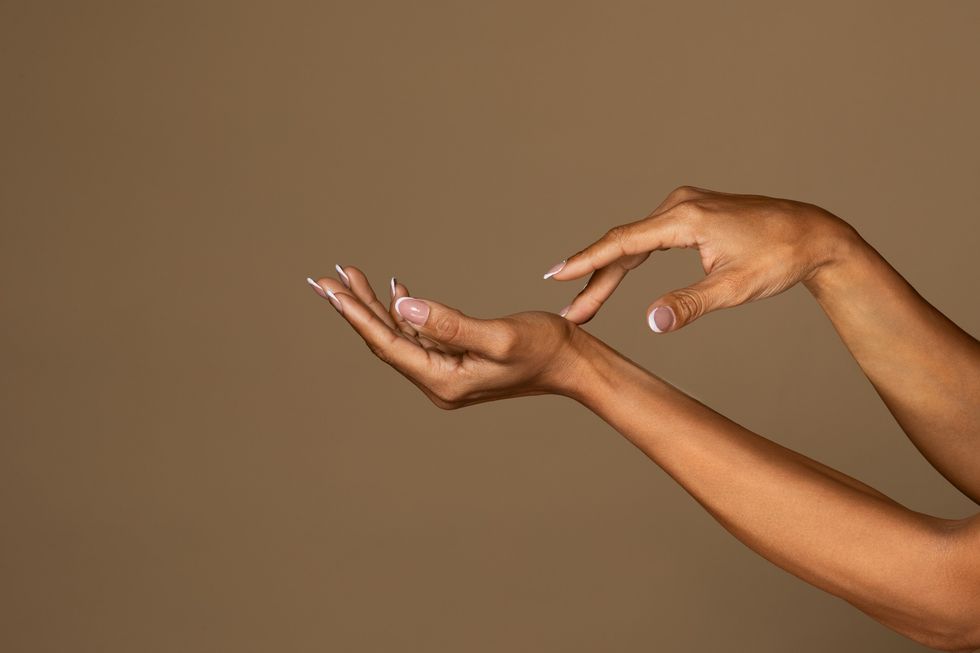
Getty Images
1. Opt for a shorter length. Not to brag but I actually have some really pretty hands and nails. That’s why, before the pandemic, I was in the nail shop all of the time; however, once we went into lockdown, I decided to keep my nails low and I haven’t really grown them out since. Something about watching all of those videos about how many germs get trapped up in there just creeped me out, chile.
Anyway, since it’s spring and you’ll be outdoors, pollen is flying everywhere and you may be doing things (like outdoor sports) that require you to use your hands in a more active way if your nails are currently on the longer side right now, you might want to go with a shorter length. Not only is it hygienic and practical, from what I’ve seen (here, here, and here), but it’s shorter nails that are also trending right through here too.
2. Do a deep hand and foot soak. While certain — cough, cough — folks are out here debating about how often you should wash your feet (the things that have tons of sweat glands and literally spend most of their time on the floor or ground), I’m encouraging you to go above and beyond and do some regular foot (and hand) soaking. They’re relaxing. They exfoliate your skin. They can also help to deeply hydrate your skin. They increase blood circulation. They also help your hands and feet to look youthful for a longer period of time.
Although there are a variety of different hand (here) and foot (here) recipes to choose from, one of my faves is to soak in an herbal tea blend — one that also has some Epsom salt and coconut milk in it. Chamomile tea can help to soothe you. Sage contains medicinal properties. Hibiscus can help to even out your skin tone. Epsom salt is great because it also helps to exfoliate and hydrate. Coconut milk is awesome because it deeply moisturizes, stimulates the production of collagen and it also exfoliates too. Soaking your hands and feet for about 30-45 minutes can make your skin’s texture feel totally different. Try it and see!

Getty Images
3. Pamper your cuticles with an essential oil blend. The base of your fingernails and toenails is your nail bed and right underneath those are your cuticles; the purpose of your cuticles is to keep bacteria from infecting your new nails as they grow out from your nail bed. Honestly, it wasn’t until I started getting hangnails that I started to pay my cuticles some real attention (in between professional manicures). I was getting them because my cuticles were dry which means that I was neglecting them. Now, I’m on top of that because hangnails are ANNOYING (and sometimes even painful).
I care for my cuticles by keeping my cuticles trimmed, pushing them back and making sure that they are well moisturized. Although there are cuticle creams that you can buy, I prefer to apply a blend of tea tree oil (it kills bacteria and fungus), geranium oil (it has astringent and anti-inflammatory properties), and avocado oil which deeply moisturizes. It makes my cuticles feel and look great.
4. Go without polish for a while. Listen, if there is one thing that Shellie Reneé Warren is gonna do, it’s get a pedicure — usually twice a month. I’m so serious about it that, even the day that my house literally blew up a few years ago (check out “My House Burned Up. Three Days Before Christmas. What It Taught Me.”), after I assessed the damage (95 percent of my stuff was gone) and talked to the fire marshal about what caused it (my HVAC), I went on to my nail appointment (dead serious). Polished toes always make me feel better and you can’t steal my joy. That’s why I hate it when my nail tech will tell me that it’s time to take a polish break sometimes.
Still, I heed the advice because, when your fingernails and toenails aren’t given the opportunity to breathe, that can lead to fungal and bacterial growth, weaker nails, dry nails, permanently stained nails, and all sorts of other drama. Ideally, since your toenails especially are covered up more in the fall and winter months, that would be the most ideal time to follow through with this particular suggestion. If you didn’t do that, though. Give your nails a month or so without any polish over the next few weeks. It might feel rough at first but it’s worth it in the long run.
5. Return to polish with lighter hues. When it comes to nail polish hues, I tend to lean into the darker ones. Spring isn’t really the time for that, though. Yeah, if ever there is a time to go with some Easter egg colors, the spring season would be it. And as far as spring color trends for this year go, you’re super stylish if you go with light neutrals, bright green, or pearly shades — or you can get super creative via InStyle’s “20 April Nail Ideas to Freshen Up Your Manicure.”
And speaking of polish (and spring cleaning), I’m pretty sure you’ve got some old bottles that need to go. For the most part, their shelf life is between 12-24 months. If it’s been longer than that, let them babies go. It’s spring. Time for new things, sis. NEW THINGS!
Let’s make things inbox official! Sign up for the xoNecole newsletter for love, wellness, career, and exclusive content delivered straight to your inbox.
Featured image by PeopleImages/Getty Images
This Is How To Keep 'Holiday Season Stress' From Infecting Your Relationship
Hmph. Maybe it’s just me, but it seems like there is something really weird happening in the fall season air (because winter doesn’t officially begin until December 21) that cuddle season is in full swing while break-up season is as well. In fact, did you know that break-ups are so popular during the holiday season that December 11 is deemed Break-Up Day?
The reasons why relationships shift around this time vary; however, I did both roll my eyes and chuckle when I read that a very popular one is because it’s an easy way to get out of getting one’s significant other a Christmas present. SMDH.
Anyway, I personally think that the less shallow folks out here may contemplate calling things “quits” or they at least distance themselves a bit from their partner (and what I’m referring to is serious relationships) due to all of the stress and strain that oftentimes comes with the holidays whether it be financial, familial, due to their tight schedules or something else.
Listen, I would hate for you and your man to miss the fun and happiness of experiencing this time of year, all because you are so overwhelmed or irritated that you can’t really enjoy it. That’s why I have a few practical tips for how to avoid allowing the typical holiday season stress from INFECTING your relationship.
Manage Your Expectations
 Giphy
GiphyUnmanaged expectations. If there is a main reason why the holiday season tends to be so stress-filled for so many people, I’d bet good money that this is the cause. And when you’re in a long-term relationship, expectations can manifest themselves in all sorts of cryptic and/or unexpected ways. You might have relatives who assume that you are going to be with them for Thanksgiving or Christmas when you have other plans in mind. You might be thinking that you are going to spend one amount for presents while your man is thinking something totally different. When it comes to scheduling, your signals may be crossed.
And you know what? To all of these scenarios, this is where clear and consistent communication come in. Don’t assume anything. Don’t dictate anything either. From now until New Year’s, mutually decide to check in once a week, just to make sure that you are both on the same page as it relates to the holidays and what you both are thinking will come along with it. The less blindsided you both feel, the less stressed out you will be. Trust me on this.
Set (and Keep) a Budget
 Giphy
GiphyOkay, so I read that last year, 36 percent of Americans incurred some type of holiday-related debt. Hmph. Last year, there was still some sense of normalcy in this country, chile, so I can only imagine what finances are gonna look like over the next several weeks. That said, since I don’t know a lot of people who don’t find being broke stressful, make sure that you and your bae set a budget and then stick to it this year — no ifs, ands or buts.
Because really, y’all — it doesn’t make sense to deplete savings and/or max out credit cards for a few days of giggles only to be damn near losing your mind because you don’t know how to make ends meet come Dr. Martin Luther King, Jr. Day.
And by the way, this tip doesn’t just speak to things like food and gifts; I also mean travel. If it doesn’t make a ton of sense (or cents) to be all over the place this year — DON’T BE.
Keep Matthew 5:37 at the Forefront
 Giphy
GiphyIf off the top of your head, you don’t know what Matthew 5:37 says, no worries, here ya go: “But let your ‘Yes’ be ‘Yes,’ and your ‘No,’ ‘No.’ For whatever is more than these is from the evil one.” That verse right there? Oh, it’s a boundaries lifesaver! I say that because do you see “maybe” or “I’ll think about it” in there? Nope. LOL. It says that you should tell people “yes” or “no” and leave it at that — and that complements Anne Lamott’s quote, “’No’ is a complete sentence” impeccably well. Yeah, you’ve got to remember that anything beyond a yes or no to a request is privileged information; you don’t owe anyone details or an explanation.
Besides, if you are really honest with yourself, when someone asks you something and you give a “Umm, let me think about it” kind of reply, more times than not, you already know what your answer is going to be — so why not let you both off of the hook? Give your response. Commit to that. And let everyone (including yourself) get on with their lives and schedules.
I promise you that when it comes to those holiday parties, you are pissing more folks off by not RSVP’ing or doing so and not showing up than just saying, “Thank you but not this year” off the rip.
Remember That Your Personal Space Is Privilege Not a Right
 Giphy
GiphyA friend of mine recently bought a new house and invited me over to come see it. He’s a single man with no children, so as I was taking in all of the space that he had, especially as I walked through his finished basement, I joked about relatives coming to live with him. “Hell no” and “absolutely not” were pretty much his immediate responses as he went on to say that some folks even had the nerve to be offended when he told them that he had no intentions on taking DNA in.
Ain’t it wild how people think that your stuff is their right? And yes, that brings me to my next point. Your home is your sanctuary space. If you want to host folks this year — cool. If not, ALSO COOL. Please don’t let folks (family included) guilt you into how they want you to act or even into what they would do if the shoe was on the other foot. You are not them — and as one of my favorite quotes states, “If two people were exactly alike, one of them would be unnecessary.” (A man by the name Larry Dixon said that.)
Hell, my friends? They know that I am good for sending them random things that they need or even want all throughout the year. Coming over to hang out at my pace, though. Uh-uh. Chalk it up to being a card-carrying member of the ambivert club yet I like keeping my living space personal — and I sleep like a baby, each and every night, for feeling that way.
Always remember that your space, your time, your resources, your energy and shoot, yourself period (including your relationship), are all things that are your own. You get to choose how, when and why you want to share them. The holiday season is certainly no exception.
Cultivate Some “You Two Only” Traditions
 Giphy
GiphyIt’s not uncommon for some couples to hit me up after the holiday season to “detox.” Sometimes it’s due to the financial drama (and sometimes trauma) that they experienced. Sometimes it’s because they allowed their relatives (especially in-laws) to get more into their personal business than they should’ve. More than anything, though, it tends to be because they didn’t get enough quality time together and so ended up feeling “disconnected.”
Please don’t let that happen. Listen, I’m not even a holidays kind of woman and yet, I will absolutely sit myself down with some hot chocolate and chocolate chip cookies to enjoy a Hallmark holiday film or two. Aside from the fact that most of them are lighthearted and sweet, I also like that they usually focus on couples loving on each other amidst all of the holiday beauty and ambiance — which is something that all couples should set aside some time to do.
Maybe it’s a vacation. Maybe it’s a staycation. Or maybe it’s my personal favorite, A SEXCATION. Whether it’s for a few days, the weekend or even overnight — don’t you let the holidays go by without setting aside time for you and your man to celebrate one another. Don’t you dare (check out “Are You Ready To Have Some Very Merry 'Christmas Sex'?”).
GET. SOME. REST.
 Giphy
GiphyI once read that 8 out of 10 people get stressed out over the holidays and 3 out of 10 lose sleep during to it — and when you’re stress-filled and sleep-deprived, that can absolutely lead to hypersensitivity, making mountains out of molehills and even not being in the mood for sex.
Your relationship can’t afford to go through any of this, so definitely make sure to prioritize rest. I don’t care how unrealistic it might seem during this time, sleep should never be seen as a luxury; it will always and forever be a great necessity.
That said, try to get no less than six hours of shut-eye in (check out “6 Fascinating Ways Sex And Sleep Definitely Go Hand In Hand”) and even ask your bae to take a nap with you sometimes (check out “Wanna Have Some Next-Level Sex? Take A Nap, Sis.”). Not only will sleep help to restore your mind, body and spirit but, when it’s with your partner, it’s an act of intimacy that can make you both feel super connected, even in the midst of what might feel like chaos.
___
Holiday season stress is real. Still, never give it the permission or power to throw your relationship off. Put you and your man first and let the holidays be what they are gonna be, chile.
Let’s make things inbox official! Sign up for the xoNecole newsletter for love, wellness, career, and exclusive content delivered straight to your inbox.
Featured image by Shutterstock
While doing a podcast interview a couple of weeks ago, when I said my age, the interviewer complimented me by saying that what I said is not what they would’ve guessed. When they asked what the secret was, the first thing that came out of my mouth was, “Oh, I’m gonna take me a nap.”
I adore sleep. I’ve said before that it’s like what Six Flags is to some people. And really, it’s just a plus that there are so many health benefits from getting plenty of rest. Beauty-wise, science does reveal that getting no less than seven hours a night can slow down signs of aging. Know what else? There are some direct things that sleep — and the lack thereof — can do to your immunity as well.
And so, since this is the time of year when catching a cold (and/or the flu) is common, let’s talk about the impact that sleep (and again, a lack thereof) has on your immune system. That way, you can remain as healthy as possible during the fall and winter seasons.
1. Less Sleep Means More Colds
 Giphy
GiphyLike I stated in the intro, I’m pretty sure you’ve heard somewhere that the fall and winter are the seasons when people are most susceptible to catching a cold or coming down with the flu. And that’s exactly why I thought I would start this all off by sharing the fact that some studies reveal that if you get less than six hours of sleep, on a consistent basis, you end up making yourself more vulnerable to coming down with both. In fact, some research says that only 18 percent of people who get six-plus hours of rest caught a cold while almost 40 percent who got less than that did.
The logic behind it all is sleep gives your body time to build up the proteins and cells (like cytokines and T-cells) that you need to fight off certain viruses. So, if nothing bothers you more than having a stuffy nose or stubborn cough when it’s cold outside, getting more sleep is one way to prevent that from happening to you.
2. Less Sleep Means More Allergy Symptoms
 Giphy
GiphyAt the end of the day, an allergy is basically what transpires whenever your immune system “overreacts” to something that other people’s systems do not. And since sleep is what helps to keep your immune system nice and strong — well, I’m sure you get how less allergy-related symptoms and more sleep go hand in hand. Also, since sleep helps to decrease bodily inflammation (more on that in a bit) and inflammation can also intensify allergy symptoms, that’s just one more reason to get as much shut-eye as possible.
3. Less Sleep Means Potential Diabetes and Heart Disease
 Giphy
GiphyDid you know that in 2024, Black women were diagnosed with diabetes 24 percent more than any other adult demographic. Also, it continues to be a reality that heart disease is the leading cause of death for Black women. These two sobering statistics alone should be enough of an incentive to do whatever you can to keep the risk of diabetes and heart disease way down.
One way to do that is by getting more sleep. Aside from the fact that sleep strengthens your immune system to where it is easier for you to fight off illness and diseases, sleep can keep your blood sugar levels in a healthy space; plus, when it comes to your heart, it gives it, along with your arteries and blood vessels a break.
4. Less Sleep Means Less Time for Your Body to Push “Reset”
 Giphy
GiphyIf you really stopped to consider all that your body goes through during the day (you can read some about that here), you definitely would respect it enough to do your best to thank it by giving it no less than six hours of sleep, each and every night. Sleep is what helps to slow your brain and body down so they are able to “refuel” for the next day. After all, how can your body prevent you from getting sick if your immune system is too worn out to fight ailments off? Exactly.
5. More Sleep Helps You to Fight Off Infections
 Giphy
GiphySpeaking of, in order for your body to fight off infections, there are certain cells and antibodies within you that need to be healthy and strong — one way that they get and stay that way is by you getting a good amount of sleep. For instance, remember when I touched on cytokines earlier? Well, the same way that they help to prevent colds, they also help to prevent infections too. And since sleep lowers your cortisol (stress) levels, rest gives your body the time and space to build up an army that can fight off free radicals and other health-related challenges while you are awake.
6. More Sleep Lowers Bodily Inflammation
 Giphy
GiphyWhenever a health-related issue is mentioned on this platform, inflammation is something that is mentioned quite a bit. Probably the easiest way to explain inflammation is it’s how your body responds/reacts whenever something is happening to your body that shouldn’t be, whether it’s an illness, an injury, a germ or something that you may be allergic to.
If you happen to have chronic inflammation, some symptoms that are associated with that include fatigue, stiff joints, skin rashes, weight gain and moodiness.
The interesting thing about all of this is if you aren’t getting enough rest, you could be triggering inflammation in your body. That’s because studies reveal that a lack of sleep can elevate molecules that are associated with inflammation. So, if you don’t want inflammation to increase within your system, you should definitely catch more zzz’s.
7. More Sleep Regulates Hormones
 Giphy
GiphyWhen it comes to hormones like serotonin, estrogen and cortisol, believe it or not, they play a role in how your immune system acts and overreacts. That’s because, if your hormones are out of balance, that can cause your immune system to work harder than it actually should and that can make you more vulnerable to sickness. One way to keep your hormones leveled out? SLEEP.
That’s because sleep gives your body the opportunity to rest, repair and restore your hormone levels. On the other hand, when you are sleep deprived, that can put/keep your hormones on the ultimate roller coaster ride. #notgood
8. More Sleep Strengthens Vaccines
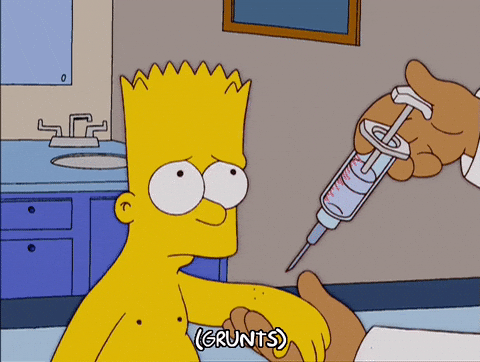 flu shot GIF - Find & Share on GIPHYGiphy
flu shot GIF - Find & Share on GIPHYGiphyIf you’re someone who is good for getting some sort of vaccine around this time of the year, make sure that you rest up before and after getting your shots. Not only does adequate rest before a vaccination help your immune system to be better receptive to your shots but sleep also helps your body to build up enough antibodies to make your vaccinations effective after getting them. Because if you’re gonna get pricked, shouldn’t it be worth it? My thoughts exactly.
Get some freakin’ sleep! Your immune system depends on it.
Let’s make things inbox official! Sign up for the xoNecole newsletter for love, wellness, career, and exclusive content delivered straight to your inbox.
Featured image by Shutterstock



